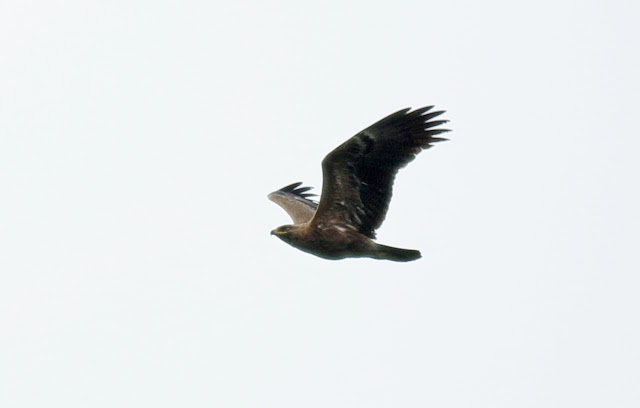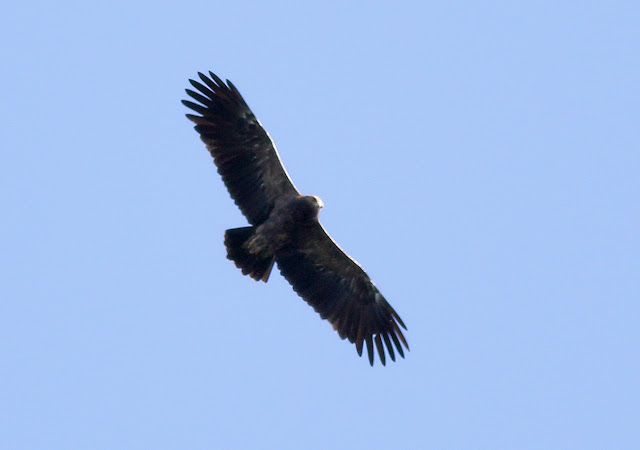 |
| Kettle of Lesser spotted Eagles with the odd Short-toed Eagle and Booted Eagle |
 |
| Immature. A small slim individual with just one narrow white outer carpal crescent. |
 |
| Immature and juvenile |
 |
| Adult type. Remiges dark with no barring. |
 |
| Short p4, light brown underwing coverts and poorly marked carpal area with a hint of a double crescent. |
 |
| 2nd cy. Three new inner primaries and rest worn juvenile. All spots worn off the upperwing coverts. |
 |
| No secondaries replaced yet and all showing the typical barring almost to the feather tip. |
 |
| Immature. Nice sandy brown underwing coverts as body and double white comma. |
 |
| Adult type with a Sparrowhawk. |
 |
| Same as above. A large heavy and pale bird that will be a female. Indistinct double white comma. Just a hint of barring in the remiges. |
 |
| Juvenile. Clean white edge to wings and tail. |
 |
| Immature. Seems to have too many replaced secondaries for a 2nd cy and the primaries show at least one fresher primary in the middle. So pres' a 3rd cy. |
 |
| Adult type |
 |
| Immature. At least 3rd cy based on the primaries. |
 |
| Immature and adult type |
 |
| Left bird is a 3rd cy with two retained outer primaries. Right bird an adult type. |
 |
| Immature. An obvious white primary flash on this bird. What appears to be a relatively new p7 in both wings should make it more than a 2nd cy |
 |
| A fairly dark individual with typical short p4 and narrow wings. Very small white outer comma and just an indication of an inner one |
 |
| Some barring visible on the remiges. |
 |
| Juvenile. Barring in remiges almost all the way to the feather tip. |
 |
| Adult type. Almost lacking carpal crescents as many LSE seem to. |
 |
| Adult. Same bird in next four photos. |
 |
| This was a dark individual not helped by a grey sky. Wings narrow like LSE and tail relatively long. Short p4. Virtually no carpal crescents. |
 |
| White primary shafts seemed to be a bit more like a GSE but I'm not sure I trust this feature. Didn't see the upperwing colour properly. Perhaps an interesting bird. |
 |
| Adult. |
 |
| A beautiful juvenile. |
 |
| Young adult? Very dark body and undertail almost dark. Remiges well barred. Seems a bit too advanced for a 3rd cy? |
 |
| Immature |
 |
| Juvenile |
 |
| Clear cut ochre nape patch like LSE |
 |
| The clear cut pale tips to tail is typical of LSE. |
 |
| The forewing colour depended on the angle of light. It could appear earthy brown one moment and then warmer the next as is visible in the last three photos below. |
 |
| More LSE like here with the forewing appearing gingery. |
 |
| A well marked juvenile LSE or hybrid? Distant birds like this probably go down as GSE more often than not. |
 |
| Adult. No carpal crescents whatsoever on this bird. |
 |
| Clear pale iris. |
 |
| Same bird as above. A thickset bird with broad wings. |
 |
| Immature |
 |
| Perhaps a 3rd cy. Middle primaries too new for a 2nd cy but doesn't look clean enough for an older bird. |
 |
| 2nd cy. Three new inner primaries and the rest juvenile. All secondaries juvenile still. |
 |
| Immature |
 |
| Near adult |
 |
| At least 3rd cy based on primary wear. Clear cut double comma. |
 |
| Juvenile |
 |
| Well marked uppertail and rump on this bird but didn't stay long enough to examine. Pretty much lacked a pale tail tip? |
 |
| Slim winged adult type. |
 |
| 2nd cy. Four new inner primaries and the rest juvenile. Also one new outermost secondary in right wing and a new central tail feather. |
 |
| Near adult. Still patchy brown underparts and undertail. |
 |
| Adult type |
 |
| Adult type. Just one outer crescent. |
 |
| Adult type with a fairly pale body. |
 |
| 2nd cy. Inner four primaries new and the odd secondary new. |
 |
| A heat hazey high 2nd cy. Compare the slightly different outline to the above immature which has more new secondaries thus creating a bulkier wing. |
 |
| Near adult. Faint barring still present in remiges, pale markings in greater coverts and some pale crescents to undertail. |
 |
| Juvenile |



















































